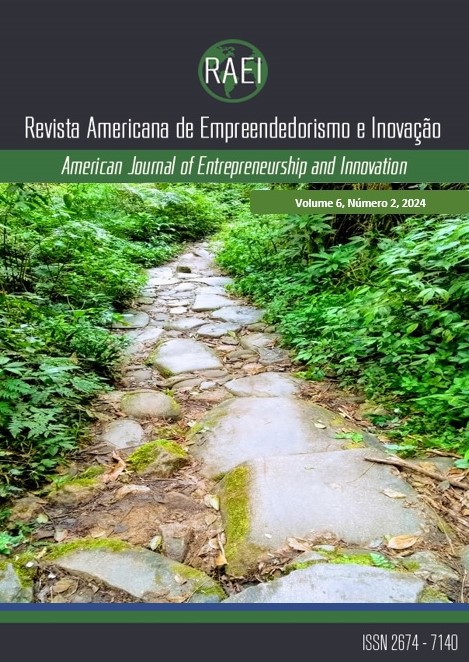TECHNOLOGICAL PRODUCTION OF PATENTS AND STARTUPS IN THE BRAZILIAN ECOSYSTEM IN 2023
DOI:
https://doi.org/10.33871/26747170.2024.6.2.9258Abstract
Technological innovation is fundamental for economic development and market competitiveness, driven by the implementation of new products, services, and business models. This study analyzes the technological production of Brazilian startups, focusing on patent ownership, using data from 2,593 active startups mapped by the Brazilian Association of Startups in 2023. Methodologically, the study is descriptive and qualitative, based on quantified secondary data compared with relevant literature. The results reveal that 22.44% of startups own patents, and these companies show greater engagement with academia (18.34%) and other industrial sectors (67.25%). Startups with patents are also more present in the final stages of development, such as traction (33.79%) and scaling (19.81%), and 42.99% of them received investments compared to 35.92% of those without patents. The analysis indicates that patent ownership serves as a quality indicator, positively influencing investors and promoting innovation within startups. Additionally, patents facilitate collaboration in open innovation, strengthening agreements and encouraging continuous innovation. It is concluded that technological development followed by obtaining patents is an effective strategy for startups, generating benefits for companies and society. Future research should include rigorous primary analyses and expand the temporal and geographical scope to obtain more robust results. This initial study on the technological production of Brazilian startups provides important insights into their impact on business success and social and technological benefits.
Downloads
References
Alves, F. L. de L., Leal, I. Q., Leite, D. X., Braga, C. B., Sobral, M. H. N. R., & Silva, G. M. M. (2023). Reflexões à importância da propriedade intelectual nas empresas startups e análise de impacto do seu tratamento no âmbito da Lei que instituiu o Inova Simples. Revista Foco, 16(5), 01-17. https://doi.org/10.54751/revistafoco.v16n5-093
Associação Brasileira de Startups-Abstartups & Deloitte. (2022). Mapeamento do ecossistema brasileiro de startups. Disponível em: https://abstartups.com.br/mapeamento-de-comunidades/
Chesbrough, H. W. (2003). Open innovation: The new imperative for creating and profiting from technology. Boston, MA: Harvard Business School Press.
Cuvero, M., et al. (2023). Start-ups' use of knowledge spillovers for product innovation: the influence of entrepreneurial ecosystems and virtual platforms. R&D Management, 53(4).
Dias, G. C., & Mazieri, M. R. (2020). As patentes como sinal de qualidade para startups alcançarem investimentos de venture capital – uma revisão sistemática da literatura. Revista de Gestão e Projetos - GeP, 11(1), 94-110. https://doi.org/10.5585/gep.v11i1.13489
European Patent Office & European Union Intellectual Property Office. (2023). Patents, trade marks and startup finance: Funding and exit performance of European startups. https://epo.org/
Leal, C. I. S., & Figueiredo, P. N. (2021). Inovação tecnológica no Brasil: desafios e insumos para políticas públicas. Revista de Administração Pública, 55(3), 512-537.
Matias, A. G. C., Pedreira, D. P., Costa, A. A. N. A., Sanatana, L. T. C., & Santana, V. E. C. (2020). Obtenção de patente e os aspectos do regime de copropriedade. Revista Brasileira Multidisciplinar, 23(1), 202-213. https://doi.org/10.25061/2527-2675/ReBraM/2020.v23i1.591
Matricano, D. (2020). The effect of R&D investments, highly skilled employees, and patents on the performance of Italian innovative startups. Technology Analysis & Strategic Management, 32(10), 1-16. Taylor & Francis Online.
Moraes, M. B. de ., Campos, T. M., & Lima, E. (2019). Modelos de desenvolvimento da inovação em pequenas e médias empresas do setor aeronáutico no Brasil e no Canadá. Gestão & Produção, 26(1), e2002. https://doi.org/10.1590/0104-530X2002-19
OCDE/Eurostat. (2018). Oslo Manual 2018: Guidelines for Collecting, Reporting and Using Data on Innovation (4th ed.). OECD Publishing, Paris/Eurostat, Luxembourg. https://doi.org/10.1787/9789264304604-en
Penof, D. G., & Pamplona, J. B. (2021). Funções e contribuições das universidades na geração de inovações: o caso da Região do Grande ABC Paulista. Avaliação: Revista Da Avaliação Da Educação Superior (campinas), 26(2), 503–524. https://doi.org/10.1590/S1414-40772021000200009
Pereira, R., et al. (2022). O sandbox regulatório no novo marco legal das startups e do empreendedorismo inovador brasileiro. Conjecturas, 22(12). https://doi.org/10.53660/CONJ-1520-2B12
Tavares-Quinhoes, T. A., & Velez-Lapão, L. (2023). Strengthening the innovation management: Insights from the Stage-Gates Model. Journal of Technology Management & Innovation, 18(2), 91-105. https://dx.doi.org/10.4067/S0718-27242023000200091
Vila Branca, S. C. de A., Pereira, L. Â., Silva, S. R. da, & Nogas, C. (2022). Abordagem sobre pesquisa e desenvolvimento (P&D) sob a ótica do modelo de inovação aberta. Revista Americana de Empreendedorismo e Inovação, 4(2), 44-55.

